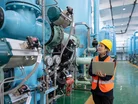The path to successful manufacturing in China & Hong Kong

Due to its thriving economic growth in recent years, East Asia has become an extremely attractive location to companies looking to expand overseas. China and Hong Kong especially have become popular destinations and offer highly prosperous bases for businesses, including those in the manufacturing industry.
Here, Dario Acconci, Hawksford’s Managing Director Business Development for Asia, explores what it is about China and Hong Kong that attracts so many businesses and what it takes to run a successful manufacturing company there.
Expanding into China with the middle class
“China is a very unique country and there is a lot of historical and cultural context to understand if you are looking to do business here for the first time,” says Acconci. “For example, you’ll need to know your audience and that China has a growing middle class population made up of 300m people – much larger than any other Asian jurisdiction.
“What’s more, it is expected that by 2030, 70% of China’s 1.4bn population will be part of the middle class. So, from a market potential perspective, China should really be regarded as a continent.”
One of the main concerns for business leaders looking to expand into China is its bureaucracy and this is because there are a vast number of licences and permits needed, which can be a laborious process to obtain.
“However, the Chinese government is looking for ways to ease the burden of this process and has demonstrated proactive approaches to changes in legislation in order to do this. Despite this, it is still recommended that business leaders clearly define the business scope of their Foreign Invested Enterprise (FIE) to avoid encountering unexpected business limitations.”
The Chinese government is also widening the potential for foreign inward investment and increasingly looking to attract specialised experts, high-technology, advanced services and outstanding talent. An example of this is the introduction of the Foreign Investment Law which gives FIEs more flexibility if they’re looking to set up companies.
Manufacturing company registration in China
If you’re a manufacturing leader looking to expand your business into China, it is important to know the options available to get set up within the country.
“Here, corporate registration for foreign enterprises is possible via three main options: representative offices (ROs), wholly foreign-owned enterprises (WFOEs) and Limited and General Partnership.”
A foreign company can establish a RO, which acts as a local branch office, to represent its activities such as market research, PR and supplier visits. However, a RO cannot participate in any direct commercial activity because it is not an independent legal entity.
“A WFOE is the most common entity for doing business in China. They are investment vehicles entirely owned by foreign natural and legal persons and are the best option when revenues and profit-making activities need to be undertaken directly, without local partners involved at the shareholding level.
“A Limited and General Partnership allows foreign companies to establish a formal presence in China by partnering with an existing, local company. By utilising this local company and accessing their know-how, distribution networks and sales channels, foreign companies can access the Chinese market rapidly and easily.”
Expanding your manufacturing business into Hong Kong
As well as China, Hong Kong also represents an ideal location for manufacturing businesses looking to expand into East Asia. It boasts many attractive qualities such as having a very minimal time difference to other major APAC hubs and the expertise and facilities needed to penetrate this market.
“Hong Kong has a number of regulatory frameworks – such as the Arrangement for the Avoidance of Double Taxation between Hong Kong and China and the Closer Economic Partnership Arrangement – which make cross-border transactions extremely easy,” adds Acconci. “What’s more, it also benefits from having access to technological innovation, a large international pool of talent, and easy access to neighbouring countries due to its strategic position.”
Manufacturing company registration in Hong Kong
It is important that manufacturing businesses looking to expand in Hong Kong know the most common types of business entities: partnerships, companies and sole proprietorships.
“Businesses established and co-owned by two or more people, with the view of sharing profits, are known as partnerships. In Hong Kong, there are two types of partnership, general and limited, and these types of businesses are governed by the Partnership Ordinance.
“Alternatively, a limited liability company can be incorporated by registering with the Companies Registry under the Companies Ordinance – these can be either private or public companies. In Hong Kong, the most popular is a private limited company, in which the liabilities of the owners are limited to the assets within the company.
“If you’re looking for the easiest and simplest form of business establishment in Hong Kong, then a sole proprietorship is for you. These kinds of businesses are owned and operated by a single person and the owner and business are considered one. However, they are the business type with the highest risk, as there is no protection of personal assets.”
- The University Manufacturing Circuit Boards from LeavesSustainability & ESG
- Schneider Electric's Commitment to Sustainable ManufacturingSustainability & ESG
- Lenovo & Saudi Alat Building Green Manufacturing FacilitySustainability & ESG
- Nissan Brings Biodiversity to the Factory through RewildingSustainability & ESG

